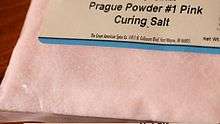Salting (food)
Salting is the preservation of food with dry edible salt.[1] It is related to pickling in general and more specifically to brining (preparing food with brine, that is, salty water) and is one form of curing. It is one of the oldest methods of preserving food,[1] and two historically significant salt-cured foods are salted fish (usually dried and salted cod or salted herring) and salt-cured meat (such as bacon). Vegetables such as runner beans and cabbage are also often preserved in this manner.

Salting is used because most bacteria, fungi and other potentially pathogenic organisms cannot survive in a highly salty environment, due to the hypertonic nature of salt. Any living cell in such an environment will become dehydrated through osmosis and die or become temporarily inactivated. Fine grained salts were more expensive but also absorbed moisture faster than coarse salt.
History
Medieval England
Salting could be combined with smoking to produce bacon in peasant homes. Instructions for preserving freshly killed venison in the 14th century involved covering the animal with bracken as soon as possible and carrying to be a place where it could be butchered, boiled in brine and dry salted for long term preservation in a barrel.[2]
Religious customs
Jewish and Muslim dietary laws require the removal of blood from freshly slaughtered meat. Salt and brine are used for the purpose in both traditions, but salting is more common in Kosher Shechita (where it is all but required) than in Halal Dhabiha (as in most cases, draining alone will suffice).
See also
References
- "Historical Origins of Food Preservation." University of Georgia, National Center for Home Food Preservation. Accessed June 2011.
- Woolgar, C.M. (2016). The Culture of Food in England, 1200-1500. Yale University Press.